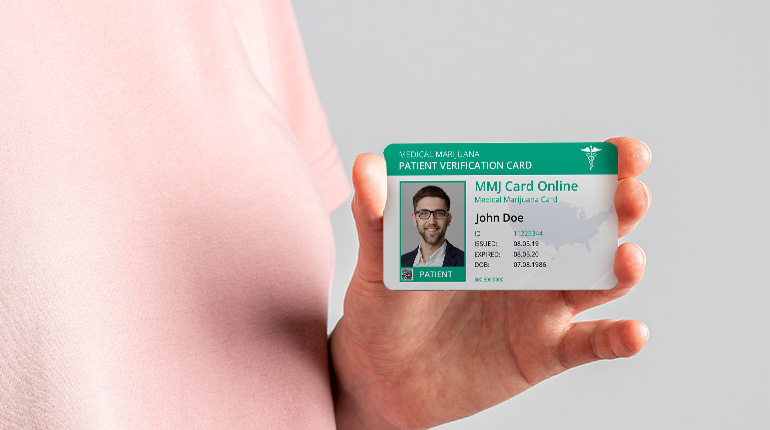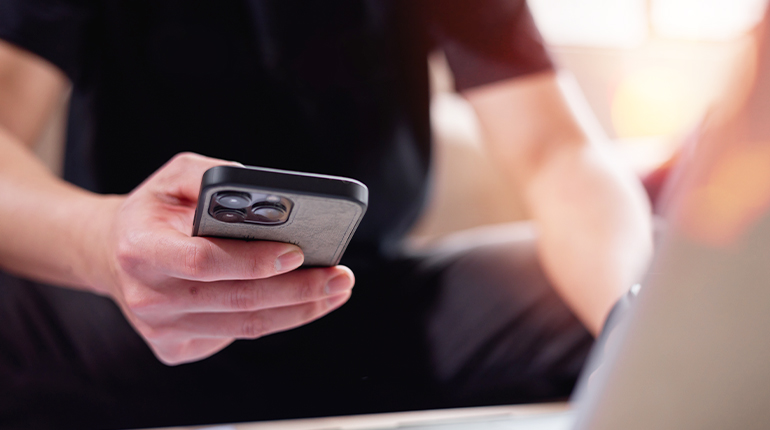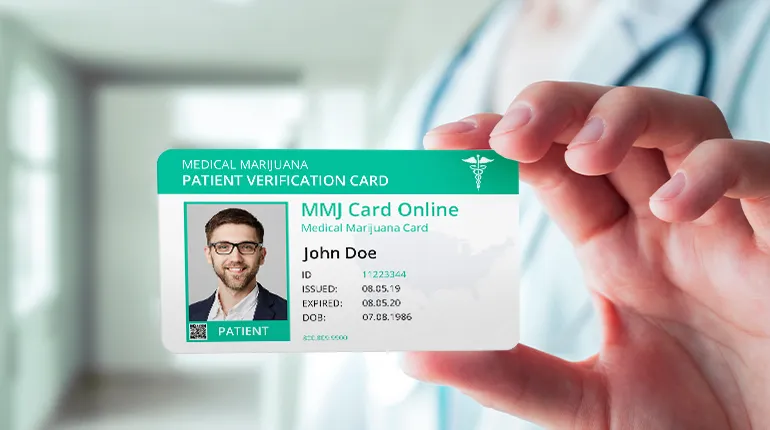Decoding the Design and Application of a Medical Marijuana Card: A Comprehensive Guide

If you’ve just applied for an MMJ card or are considering doing so, you may be curious about what it looks like. Although millions of people have one in the United States, you’re unlikely to see it outside a cannabis dispensary.
This is because marijuana remains a federally illegal substance, and even if your state allows it, you could lose your job if your employer discovers that you use MMJ. Therefore, few cardholders are keen to show off their card!
Fortunately, we have created a guide outlining what a physical MMJ card looks like.
The Anatomy of a Medical Marijuana Card
The precise data featured on the card might differ depending on the state. Nonetheless, you can expect certain information to appear on the front and back of the card, as we outline below.

What information is on the front of the card?
- Patient’s information: The patient’s personal information, including their complete name, date of birth, and patient ID, is often on the front of the card. It should also outline their residential address within the state.
- The patient’s photo: The card features a clear image of the MMJ patient. This ensures it’s easy for dispensary staff and law enforcement to identify the patient as the rightful cardholder.
- Card issuer: The name or logo of the organization or division in charge of issuing the card may be seen there. This might be a particular cannabis regulating body or the state’s health department.
- Date of expiry: The card should have an expiry date that indicates how long the medical marijuana prescription is valid. To continue having legal access to medicinal cannabis beyond this time, the patient must renew the card.
- Cultivation information: Depending on the state’s rules, the front of the card might also outline whether the cardholder can cultivate marijuana as an MMJ patient.
- Card design: The front of the card could have a pattern or color scheme related to medicinal marijuana or the organization that issued it. This could vary greatly depending on the state.
What am I likely to see on the back of the card?
- Legal information: The reverse of the card often includes warnings or guidelines for using medicinal marijuana and legal information. This may include dosing guidelines, consumption techniques, storage, and the cardholder’s legal rights and obligations.
- A black magnetic strip: You might see a strip akin to what you’ll find on a debit/credit card. Dispensary staff can swipe your card to track purchases and ensure you remain within the state’s limits.
Digital Versus Physical MMJ Cards: The Pros and Cons
For a long time, it was only possible to get a physical medical marijuana card, which the state program sent to patients in the mail. However, a growing number of states have dispensed with old-fashioned cards, replacing them with digital versions.
Let’s take a look at the pros and cons of each option.
What is a physical MMJ card?
Patients permitted to use medicinal marijuana for therapeutic reasons are often given physical MMJ cards. This card is evidence of the patient’s ability to purchase and use medicinal cannabis and is a tangible representation of their legal authorization.
Although it’s being replaced in numerous states, it is the traditional MMJ card format.
What are its pros?
- Widely accepted: Dispensaries, hospitals, and related businesses often accept physical MMJ cards without hesitation or dependence on technology.
- Tangible evidence: Patients with physical cards have a tangible form of documentation. This is comforting to some users and may be essential in certain circumstances when physical evidence is required.
- Familiarity: Physical cards may be more recognizable and simpler for medical professionals or law enforcement to validate since they resemble other identity cards, streamlining the procedure.
What are the downsides?
- Potential loss or damage: Physical cards can be lost, damaged, or misplaced. These occurrences are inconvenient, requiring extra costs or efforts to replace the cards.
- Renewal hassles: Compared to the digital renewal procedure, renewing physical MMJ cards sometimes entails paperwork, shipping, or in-person visits.
- Privacy issues: Some patients may feel uncomfortable carrying a physical MMJ card since it could attract unwelcome attention or criticism from others. Should a colleague or employer spot the MMJ card in a patient’s wallet or purse, the cardholder’s employment could be in jeopardy.
What is a digital MMJ card?
A patient’s authorization to use medicinal marijuana is represented digitally via a digital MMJ card. It is sometimes referred to as an electronic or virtual medical marijuana card.
The state program sends the digital card, usually via email. Then, the patient can download it on a smartphone, tablet, or other electronic device. Digital MMJ cards aim to provide a practical and accessible replacement for conventional physical cards.
What are its pros?
- Convenience: Patients can easily and instantly access their digital MMJ cards whenever required without carrying a physical document. This is because digital cards are often saved on smartphones or other electronic devices.
- Accessibility: Getting and renewing digital cards online is a simple matter. Thanks to the availability of digital cards via approved mobile applications and websites, it is often possible to get one without the need for in-person visits or physical documents.
- Privacy: Patients who choose to securely keep their digital MMJ cards on their own devices add an extra degree of privacy, reducing the possibility that others will discover the card. It also decreases the risk of losing it.
What are the downsides?
- Technological dependence: Digital MMJ cards depend on technological devices, Internet access, and certain mobile applications or platforms. Patients might have difficulty using their cards when necessary if their devices fail, run out of battery power, or there is no Internet connection.
- Limited acceptance: Not all dispensaries accept digital MMJ cards. The ease of employing a digital version is limited by the need for physical copies in certain locations for verification. Also, digital cards are only available in a few states at present.
The number of states that issue digital MMJ cards is growing. They include:
- Arizona
- Illinois
- Iowa (Not an accepted medical marijuana program)
- Minnesota
I Have Visited a Dispensary with My MMJ Card; What Next?
As an MMJ cardholder, you can visit a licensed dispensary to buy your medicine. Here’s an overview of what this process might look like.

Check-in or registration
You may need to sign in or register as a patient when you visit the dispensary. You must show your MMJ card and legitimate identification, such as a passport or driver’s license. Your credentials and eligibility to buy medicinal marijuana are confirmed by the dispensary personnel.
Consultation or product selection
After checking in, you could have the option to speak with an informed staff member. They can advise you on choosing the best cannabis products depending on your health situation and desired results. They may describe various strains, consumption styles, and available products.
The employees at the dispensary should provide thorough details about the different cannabis products, including their strength, effects, suggested dose, and any adverse effects. Additionally, they might provide recommendations for certain goods in line with your tastes and medical requirements.
Purchasing and payment
After making your decision, a staff member will show you how to complete the transaction. Several payment options may be available depending on the dispensary and local laws. While some dispensaries solely take cash, some could also accept alternative methods. To make sure you have the right payment method, it is important to call the dispensary in advance.
Remember that the procedure may change based on the jurisdiction and the rules in force. You should be informed of the local rules and regulations and chat with dispensary staff if you have any doubts.
How Does a Dispensary Know I Have Reached My Purchase Limit?
Depending on the state program’s rules, there are several ways in which a dispensary knows whether an MMJ patient has reached their limit. To manage and enforce monthly limitations, dispensaries may use the following strategies.
Patient registry system
Many states have a database or patient registry system that keeps track of important details about MMJ patients, including their permitted monthly dosages. Dispensaries can use such a system to check the patient’s status and keep track of their purchases.
Patient verification
Patients are often asked to show their MMJ cards and a legitimate form of identification when they visit a dispensary. To ensure a patient is qualified and establish their monthly limit, dispensaries confirm the patient’s identification and compare their data with the patient register or database.
Tracking
Dispensaries keep tabs on every patient’s purchase, including the volume and type of products bought. By keeping track of these transactions, they monitor the patient’s consumption and determine if they have hit their monthly limit. Point-of-sale systems or other record-keeping techniques are used for this process.
Compliance with state reporting requirements
State MMJ programs or regulatory bodies often require reporting from dispensaries. Periodic reports detailing the purchases made by each patient, including the amounts of medicinal marijuana acquired, are requested from cannabis businesses. These reports support patient consumption monitoring and help assure adherence to monthly limitations.
Knowing that a dispensary can monitor monthly limitations in various ways is important. While some businesses use manual record-keeping techniques, others might have more sophisticated systems like real-time tracking via integrated software solutions.
How Does My MMJ Card Keep Me Protected?
In instances involving medicinal marijuana, having an MMJ card offers legal protection and certain rights. However, the amount of protection might vary depending on the state. Here are some broad things to think about concerning the law and possible run-ins with the police.

Legal permission
An MMJ card indicates that you have been given legal permission to use medicinal marijuana by your state or local government. It shows that you have gone through the required steps, such as a doctor’s recommendation, to lawfully acquire and use cannabis for medicinal reasons.
Medical use defense
Suppose you are stopped by a police officer while in possession of marijuana. A valid MMJ card may serve as a defense on legal grounds in states where medicinal marijuana is permitted. The card proves that you are taking cannabis for medicinal reasons and might show that you abide by all regulations.
Learn the legislation
It’s important to know the rules and legislation for medicinal marijuana in your state. This entails being aware of applicable limitations on possession, growing, consumption, and other activities. You can exercise your rights and react accordingly when encountering law enforcement by knowing MMJ laws in your region.
Cooperation and communication
It is best to stay composed, cooperate, and talk politely with a police officer if you are stopped and found to have medicinal marijuana. At the officer’s request, please show them your MMJ card and any other necessary identification. Let them know that you are a registered MMJ patient.
Consult legal counsel
Speak with a trained lawyer with knowledge of cannabis law if you run into legal problems or are charged with anything linked to your use of medicinal marijuana. They may provide direction and counsel catered to your particular situation and legal system.
Please remember that the above is only a basic overview. The appropriate action will rely on the unique facts and legal situation. To guarantee accurate and current advice, it is always important to contact legal experts or organizations knowledgeable about the rules and regulations of medical marijuana in your region.
Final Thoughts on Medical Marijuana Card Design and Utility
If you live in a state where medical marijuana is legal, applying for an MMJ card can give you legal access to the substance. Once it is in your possession, you can enter a licensed dispensary and purchase cannabis per your state’s medical marijuana laws.
While the information on the front and back of the card might vary a little from one state to the next, it is mainly the same across the board. These days, digital MMJ cards are available in certain states. They eliminate the need to carry a physical card with you and may provide additional convenience for MMJ patients.
FAQ
Here is some additional information on MMJ cards and their uses.
Why do I need a medical marijuana card?
There are many good reasons why you should apply for an MMJ card. If you live in a state with a medical marijuana program that hasn’t legalized adult-use cannabis, the card is the only way to legally access the plant. Even in states with recreational weed, having an MMJ card usually ensures higher purchase and possession limits and the ability to buy more potent products.
What happens if my state only issues digital MMJ cards?
It means that you will not receive a physical card in the mail. Instead, the state will send you the card online, and you can download it for easy access on a mobile device. Digital MMJ cardholders say it is more convenient as it makes renewals and purchases easy. They also don’t have to worry about losing or misplacing a physical card.
Can I grow marijuana if I have an MMJ card?
That depends on the rules of your state’s medical marijuana program. There are plenty of locations that refuse to permit home cultivation. If your state allows it, you may need to pay an additional fee and clearly mention your intention of growing weed. There are clearly defined limits on how much you can cultivate, usually between two and six mature plants depending on the state.
Can a police officer seize my marijuana even if I have an MMJ card?
Yes. Law enforcement officials have discretion when enforcing the law. Therefore, they can confiscate your marijuana even if you have an MMJ card. It is worth remembering that the substance remains federally illegal. So, it is a crime to bring it across state lines, regardless of whether you have a card or marijuana’s legal status where you visit.
